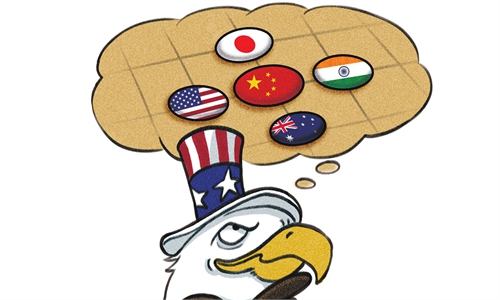
First Quad summit Illustration: Chen Xia/GT
Leaders from the US, Japan, India and Australia are set to meet for the first-ever in-person Quad summit in Washington on Friday.
Without mentioning China, a White House statement about the summit said that the Quad leaders will focus on deepening ties and advancing practical cooperation on areas such as combating COVID-19, addressing the climate crisis, partnering on emerging technology and cyberspace, and promoting a free and open Indo-Pacific.
But since it is clear that the four-way alliance is part of the US-led efforts to counter China in the Asia-Pacific, public attention is understandably expected to be focused on what kind of cooperation Quad could agree to contain China's growing presence in the region.
From the AUKUS security pact last week to the upcoming Quad summit, the US is clearly pushing for geopolitical confrontation in the Asia-Pacific region. It seems that the US has never got tired of moving its allies around like pieces on a chessboard against China, but it remains questionable whether it still has the capability of organizing any substantial cooperation in terms of supply chains or regional security.
A recent Nikkei report said that the Quad looks to "launch a joint initiative to map capacity, identify vulnerabilities and bolster supply chain security for semiconductors and their vital components," according to the draft of a joint statement. The report viewed the move as apparent efforts to counter China.
If Quad leaders really announce cooperation on bolstering chip supply chains as the Nikkei report suggested, the end result would likely be little more than empty promises. Anyone with the basic knowledge of the global chip supply situation would question why the US chooses to work with the wrong partners when it comes to securing its chip supplies.
South Korea and the island of Taiwan together supply a significant part of the world's semiconductors, and they can be easily convinced to join a US-led initiative to ensure its chip supplies.
It is also conceivable that the cooperation on semiconductor supply chains would put two of the Quad nations, Australia and India, in a very uncomfortable position, it is clear that there is no domestic industrial basis for Australia and India to contribute to global semiconductor supply.
If the US keeps using supply chain cooperation as a fig leaf for its geopolitical games, then many believe that its domestic chip shortage crisis will last for quite a long period of time.
If anything, the apparently flawed cooperation may only underscore the lack of foundation for economic cooperation among Quad. In fact, it is nearly impossible for Quad to develop substantial economic cooperation. China is the center of Asia-Pacific supply chains. Given their heavy reliance on China for trade, the Quad's talk of building any supply chain excluding China in the region is empty rhetoric.
The Quad mechanism first emerged in 2004 for the joint response to the 2004 tsunami before coming apart in 2008. It failed for a reason. Geopolitical games can hardly be a strong enough glue to hold together a loose collation of nations all pulling in different directions.



